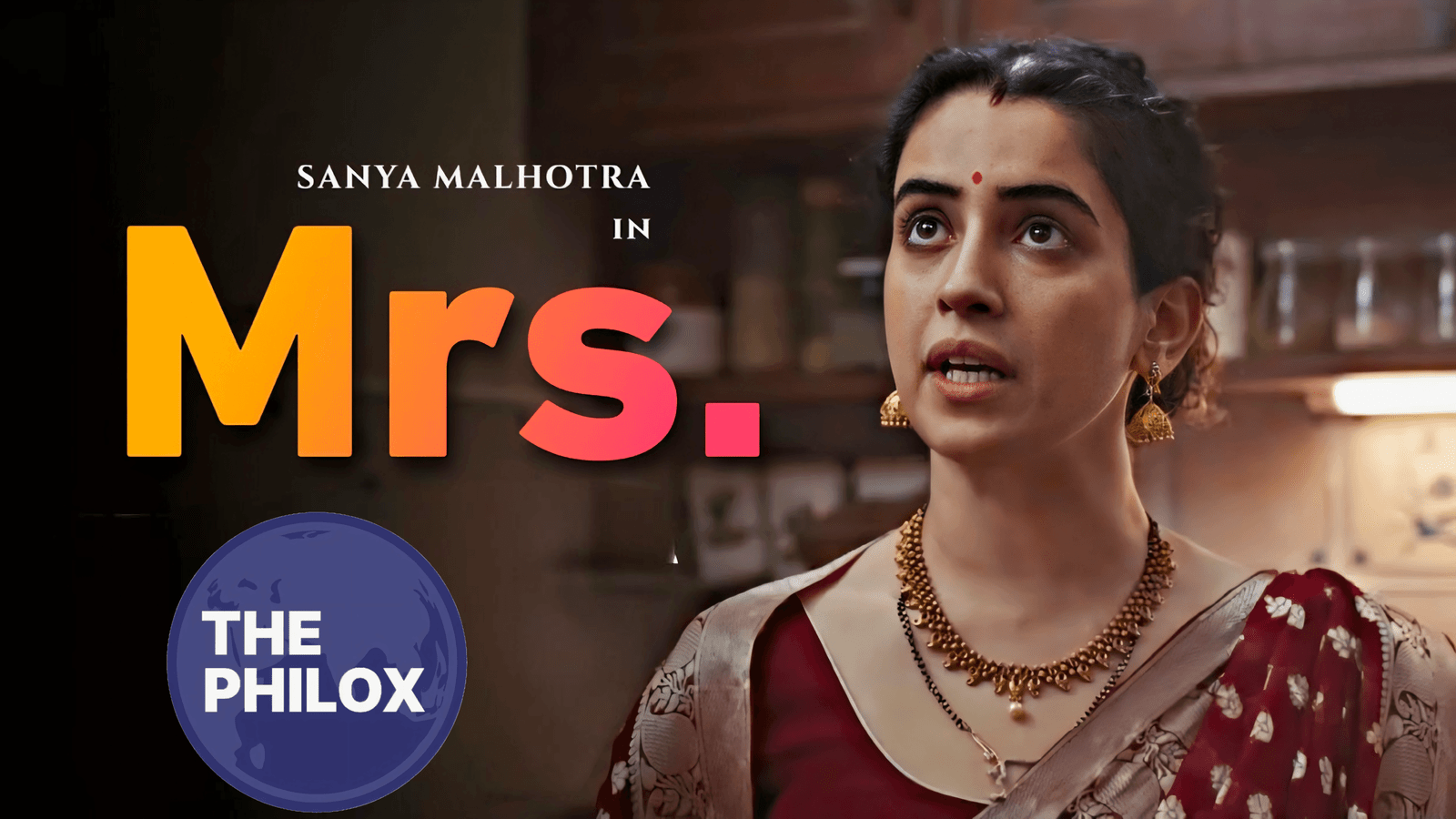Mrs. (2025) is evidence of how long cinema has long been a potent tool for mirroring society truths.
Under the direction of Arati Kadav, this Hindi translation of the critically praised Malayalam film The Great Indian Kitchen (2021) explores closely the unsung challenges of women in conventional homes.
With the very gifted Sanya Malhotra as Richa, the film tells a gripping story about a young lady whose goals and aspirations are suppressed by patriarchal expectations following her arranged marriage to Diwakar, played by Nishant Dahiya.
Mrs. captures the sometimes disregarded mental and physical toll of domestic servitude with a provocative plot that highlights the systematic oppression women experience inside the boundaries of marriage.
The movie is a major work of art that questions the status quo since it tells a single tale but also reflects many women caught in like circumstances.
Plot summary: Dream of a dancer. Broken by Domesticism
Passionate and trained dancer Richa arrives at her marital house full of hope, ready to pursue her dance career while also appreciating her new life as a wife and daughter-in-law. But the weight of strict family customs and constant housework quickly saps her ambitions.
Though not blatantly nasty, Diwakar reflects the tacit acceptance of patriarchal values. Played by Kanwaljit Singh, his father reflects the ingrained conviction in male domination of the older generation, therefore supporting the idea that a woman’s main responsibility is to serve her husband and family.
Richa is supposed to get up before everyone else, cook complex meals, clean, and follow a strict set of house rules devoid of room for personal development.
Days become weeks and Richa starts to feel choked. Every effort to set aside time for oneself is greeted with resistance—direct criticism or subdued rejection.
The movie painstakingly shows her change from a hopeful, aspirational lady into someone caught in a boring, underpaid cycle of work, wondering whether this is all life has to offer her.
Mrs. presents a startling but realistic picture of how customs, sometimes praised as “family values,” could be weaponized to stifle women via Richa’s journey.
The narrative depends on the silent, relentless persecution many women go through daily, not on overt violence or dramatic confrontations.
An Evaluation of Patriarchal Standards
Fundamentally, Mrs is a harsh critique of the regressive practices still alive inside marriage and Indian culture, not an attack on either. The movie stresses how customs, when unchecked, may turn into instruments of oppression.
Even in educated and capable of following their jobs, women are expected in many Indian homes to assume domestic tasks without protest.
Women find it tough to dispute these assumptions without running across social reaction since their normalcy usually results in their tacit acceptance.
From metropolitan professionals compelled to decide between work and marriage to homemakers whose unpaid labor goes underappreciated, Richa’s struggle matches the lived experiences of countless women.
Mrs. challenges viewers to consider their own role in maintaining such standards by emphasizing on these daily challenges instead than lofty feminist claims.
Managing the Reversal: Art as a Change Agent
Mrs. has not been without controversy notwithstanding her creative quality and critical praise. Right-wing and conservative groups have attacked the movie for unflattering portrayal of Indian families and for thus compromising of traditional values.
Many contend that the movie unfairly presents men in a negative light, hence stressing the “worst aspects” of marriage and domestic life.
Still, such critique seems to result from a reluctance with facing difficult facts. Mrs reveals the fundamental gender differences in marriage and family life rather than attacking either.
The movie criticizes the systematic indoctrination that upholds these relationships, not villainizes men as individuals.
The criticism is evidence of the influence of the movie; if Mrs. were an irrelevant or overdone story, there wouldn’t have been such strong arguments. The opposition to the movie emphasizes even more the necessity of such dialogues to propel society toward further reflection and transformation.
A Stellar Performance: The Career-Defining Role of Sanya Malhotra
The very subtle performance of Mrs. Sanya Malhotra is among her most amazing qualities. Richa vividly brings to life a character many women may find themselves in.
Her ability to portray with simple gestures dissatisfaction, tiredness, and quiet resilience helps to increase the impact of the movie.
Malhotra presents a subtle yet strong picture; she lets her quietness, body language, and lingering looks speak for itself instead of theatrical outbursts.
When Richa conceals her rage, the viewers can sense her suffocating weight. Viewers sense the few flashes of freedom she clings to when she dances alone.
Her performance has been much appreciated; she won Best Actress at the New York Indian Film Festival 2024. Malhotra has once more shown her ability to gracefully take on difficult, emotionally demanding plays, therefore this accolades are well earned.
Arati Kadav’s direction is a Masterclass in Understated Storytelling.
Director Arati Kadav gives Mrs. a unique cinematic perspective, which makes the ordinary feel oppressive and the daily seem stifling. The deliberate slow pace of the movie reflects Richa’s daily schedule and envelops the viewers in her universe.
Especially noteworthy is Kadav’s frequent usage of the kitchen. What should be a sanctuary of warmth and nutrition becomes a site of captivity where Richa’s labor goes unseen but is demanded.
The audience feels as imprisoned as she does as the constant nature of her imprisonment is driven home by the repeated scenes of cooking, cleaning, and meal serving.
The color scheme, photography, and background music of the movie help to create a silent sadness.
Particularly the sound design improves the storytelling—clanking utensils, the sizzle of oil, and the hum of daily activities provide a terrible backdrop to Richa’s life.
Social Commentary and Sceneplay
Mrs. has one of better scripts since it combines realism with a subdued criticism of patriarchal systems. The conversations seem real, mirroring the passive-aggressive character of modern sexism instead of turning to forceful, combative disputes.
The fact that the movie can appeal outside of India adds even greater power. Though firmly anchored in Indian customs, Mrs.
gender norms, unpaid domestic labor, and the repression of women’s autonomy—are universal themes.
An Agent of Change and Discussion
Mrs. has started significant conversations on social media after her publication as many women have shared their own experiences of gender-based expectations and household challenges.
The movie has been commended by women’s rights groups for bringing attention to these problems, therefore inspiring audiences to see the value of gender equality inside marriage and households.
Though some have written off the movie as “feminist propaganda,” its increasing popularity points differently.
Mrs’s eliciting such divisive responses suggests that she is tapping a nerve, pushing people to face reality they might choose to overlook.
In essence, a movie that begs to be seen
Mrs. is a statement not merely a movie. Nestled under the cover of obligation and tradition, it is a moving, essential examination of the quiet battles many women experience.
Mrs. is among the most significant movies of the year with great performances, careful direction, and an emotionally relevant story.
Mrs. is a movie that begs to be viewed, talked about, and considered whether one agrees with its message or not. It asks the viewers to reconsider gender norms, doubt their impressions, and maybe move toward a more fair society.
Stay Connected and Share Your Stories
For all those inspired by stories of resilience and ambition, follow us on X/Twitter and on Instagram . For those with untold stories that you would love to share, please send them to contact@thephilox.com




